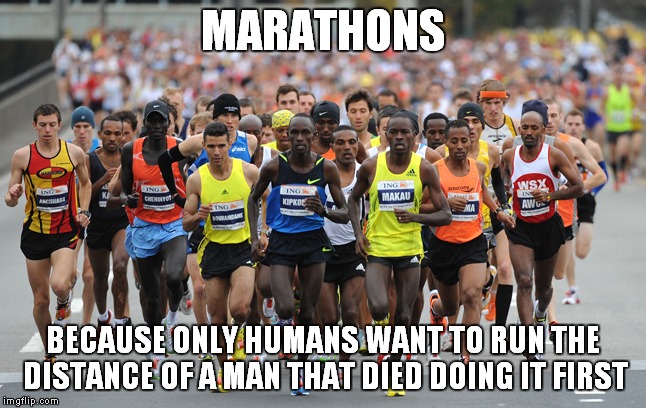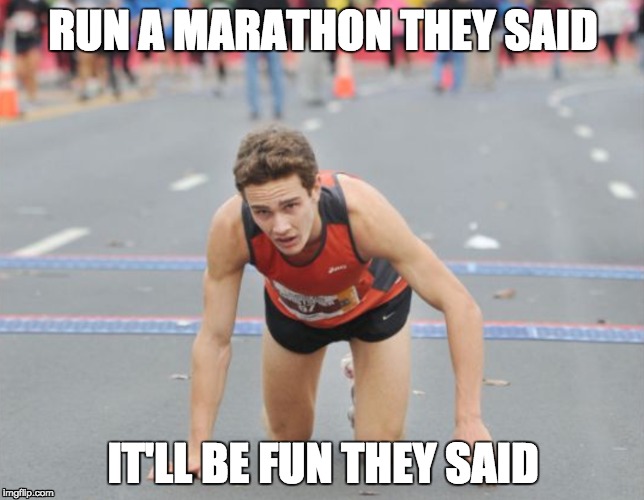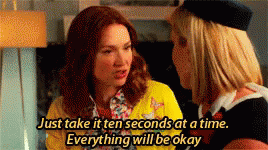Scenario 1:
Picture this: You're going to run a marathon.Some of you probably started crying just imagining trying to run a marathon, but now picture this: I'm your coach. In fact, there is a group of people who are all prepping for this race together, and I'm coaching all of you.
I'm not going to take into account any of your previous training or your current level of fitness, but I'm going to tell you that you have to run your marathon in three months. I'm also going to set the exact same training schedule for all of you. By the end of week one, everyone needs to have run 25 total miles. By week two, 60 miles. Week three...you get the point.
That means that Bob, the 60-year-old who's had a desk job his whole life and thinks a healthy meal means eating the pickle that they give him with his burger, and Maria, the 26-year-old competitive crossfitter who understands what macros and calories are, both have to train at the exact same pace.
Now, I'm also going to be holding everyone accountable to the same timeline. So, when Bob ends his first week having only run 12 miles, he still has to complete his 13 miles plus the 60 miles next week in order to keep up with the group, meaning he has 73 miles to carry his cholesterol-riddled body that week.
Sure, maybe a few people in the group might end up being able to run the marathon, and maybe a few people will end up healthier than when we started, but the reality is that most people in the group will feel hopeless, will end up with injuries, and will want to give up on health altogether.
Scenario 2:
Now, let's picture another scenario. I have that same group of people. Instead of saying, "All of you are running a marathon in three months," I say, "All of you are going to be healthier in three months." There are some very important differences in these two approaches.Difference #1: We are focusing on a purpose over a product. Being healthy and running a marathon are not the same thing. One is a predetermined, narrow definition of success, while the other opens a variety of avenues towards success.
Difference #2: I don't have to have everyone do the same thing. Bob, our hamburger-loving friend, can start by analyzing his diet, while Maria, our muscle-milk drinking health nut, can start thinking about mental health or maybe taking what she's already good at and looking at how to get better.
Difference #3: I can allow people to pursue their passions. Maybe Bob reveals that he loves being outside. Great! Now instead of forcing Bob onto a treadmill for hours at a time, I can encourage him to go outside and try hiking. Maria loves crossfit, so I don't have to tell her to stop doing what she loves, but now I can support her in her passion.
I could go on and on about the differences, but I should get to the whole point of this before I lose everyone.
Here's the point: Forcing every student to read the same novel at the same pace and expecting success is the exact same as forcing everyone to train for a marathon as the same pace and expecting people not to die.
They're both ludicrous and, I would argue, not supported by evidence to show that they are effective approaches, but refuted by lots of evidence to show that they won't work. I have really tried to find research to support the guided reading of full novels in class. I can't find anything that support this instructional approach. (Please, if you can, prove me wrong.)Then why is this the predominant method of instruction in ELA classes? More importantly, with the changes happening in culture where information is condensed, most people are no longer reading outside of the world of academia, and media is now the dominant force of information and entertainment in our society, why in the world are we dedicating so much of our class time to reading novels?
I am in no way saying that guided reading is wrong. Students need the experience of having an experienced reader guide them through the critical analysis of a text. What I am saying is that having an experienced reader guide them through 200 pages of text is a painful process for everyone involved that very often doesn't result in learning, or at least very much learning.
Here's one of the biggest reasons why I would eliminate guided reading of class novels if I could:
Take a second to really think about what this chart is telling us. Students who comprehend less than 75% of the text end up further behind than they were before.
Students who comprehend less than 60%, which we all know we have students in our rooms who are around there, are falling behind their peers at an alarming rate. Even the students who can comprehend 75-85% are only growing a tiny bit. Yet, when we have the reading skill equivalent of Bob and Maria in the same classroom, we still should be teaching a good month or more with everyone reading the same text?
I'm not saying having everyone read the same text is wrong, but I'm saying that forcing everyone to try to read the same level text for an extended period of time at the same pace is about as effective as throwing the text out the window and expecting the birds to become more literate.
Here's another reason why whole-class guided reading of novels is self-defeating:
I can convince someone to do basically anything for a short period of time.
Read a short story? Sure, they'll hang with me. Watch a short film? I can keep their brains engaged for that time span.
Read a novel that I chose for them to read and expect them to enjoy it and learn from it? Uh...nope. I don't care how good of a teacher you are - that is impossible. And telling yourself otherwise is a nice delusion of a world filled with rainbows and butterflies where students show up loving reading every day.
The issue is that in order for students to engage in an extended period of intense thinking, or to put it another way, in order to get students into a state of flow, we have to allow them to select texts of interest for themselves. Do I love The Great Gatsby? Absolutely! Do I love teaching The Great Gatsby? Of course! Do all kids love reading The Great Gatsby?
Of course they don't. Even though I love it now, I hated it in high school. No matter how much we try to show students how awesome our favorite literature is, we will never convince them it's interesting until they've had the experience of reading a book that they truly enjoy.
Only when we see value in the process and have had a positive experience with the medium will we ever be willing to do something slightly uncomfortable or see value in what's difficult.
Closing:
I typically try to keep my posts short, and this one has gone on for a while, so I want to just end with some final thoughts, and I want to connect them to the difference listed about between the two opening scenarios.
1) We have to start emphasizing process over products. Reading The Great Gatsby won't make students better readers. Reading Lord of the Flies won't make students better readers. There is nothing inherent in those books that will take minds that don't want to learn and begin to mold them. If we start shifting our focus away from specific texts and start focusing on the skills, we can let go of the idea that all kids must be doing the same thing and focus on the truly important piece: all kids need to learn the same skills, wherever they are at.
2) We have to understand that we can never overcome the barrier of disinterested students by trying to spice up texts they aren't interested in. I don't mean we should never stretch students outside their comfort zone, but if we spend hours and hours thinking about how to make an uninteresting text interesting for our students, why don't we choose a more interesting text and then spend those hours focusing on what matters: feedback to students, differentiated materials, etc. Let students identify things that interest them and we will find much more joy in teaching. It is no longer about forcing students to read texts and complaining when they haven't read the required chapter. It's about taking what students are reading and prompting them to develop skills to make their reading more powerful.
3) Passion is the most powerful thing we can allow our students to pursue. The other day I asked my students what they were passionate about, and the room looked like this...
They didn't know what they were passionate about, and the sad reality is that a lot of that is due to the fact that they are never given time to explore that idea. Let kids explore their passion. Otherwise, we are going to end up with a lot of kids who know how to use Sparknotes but have no idea what they want to do in the world.
So please, next time you've used up countless hours and class period just getting kids to slog through material that they hate, ask yourself: Is this worth all the instructional time I've dedicated to this novel? Is there a better way?
I'm not saying there's a silver bullet. Independent reading is tough. Literature circles are tough. Short stories won't always hit the mark.
However, don't let the possibility of failure keep you from moving away from something that's already failing. If we want students to love reading, let's stop cramming novels down their throat. Let them choose novels they will fall in love with. If we want students to grow, let's stop spending so much time with texts that aren't in everyone's zone of proximal development. Finally, if we want to do what's best, we have to stop following the "it's what we've always done" mindset. It will never result in growth, and it won't even result in maintaining the status quo; if we aren't moving forward, we're falling behind.
But we are educators, and we wouldn't be doing this job if we didn't want to improve the lives of the next generations. If anyone can do it, we can.






Comments
Post a Comment